Fleurs du Mal Magazine


Or see the index
10 décembre 1919: le prix Goncourt est attribué à Marcel Proust pour À l’ombre des jeunes filles en fleurs.
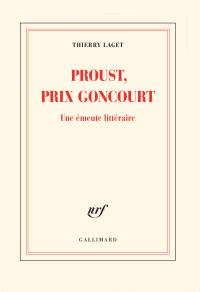 Aussitôt éclate un tonnerre de protestations : anciens combattants, pacifistes, réactionnaires, révolutionnaires, chacun se sent insulté par un livre qui, ressuscitant le temps perdu, semble dédaigner le temps présent.
Aussitôt éclate un tonnerre de protestations : anciens combattants, pacifistes, réactionnaires, révolutionnaires, chacun se sent insulté par un livre qui, ressuscitant le temps perdu, semble dédaigner le temps présent.
Pendant des semaines, Proust est vilipendé dans la presse, brocardé, injurié, menacé. Son tort? Ne plus être jeune, être riche, ne pas avoir fait la guerre, ne pas raconter la vie dans les tranchées.
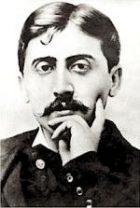 Retraçant l’histoire du prix et les manœuvres en vue de son attribution à Proust, s’appuyant sur des documents inédits, dont il dévoile nombre d’extraits savoureux, Thierry Laget fait le récit d’un événement inouï – cette partie de chamboule-tout qui a déplacé le pôle magnétique de la littérature – et de l’émeute dont il a donné le signal.
Retraçant l’histoire du prix et les manœuvres en vue de son attribution à Proust, s’appuyant sur des documents inédits, dont il dévoile nombre d’extraits savoureux, Thierry Laget fait le récit d’un événement inouï – cette partie de chamboule-tout qui a déplacé le pôle magnétique de la littérature – et de l’émeute dont il a donné le signal.
Thierry Laget
Proust, prix Goncourt. Une émeute littéraire
Collection Blanche, Gallimard
Parution : 04-04-2019
272 pages
140 x 205 mm
ISBN : 9782072846786
Genre : Essais
Prix €19,50
# new books
Thierry Laget
Proust
prix Goncourt
• fleursdumal.nl magazine
More in: - Book News, Archive K-L, Archive O-P, Archive O-P, Art & Literature News, Awards & Prizes, Marcel Proust, Proust, Marcel
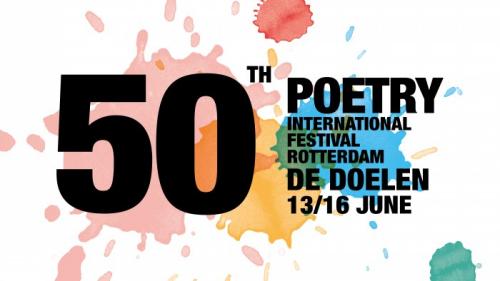
This year, the Poetry International Festival Rotterdam turns 50!
The milestone makes it the oldest festival in the city, and one of the oldest in the country, with a wealth of history and highlights. Nobel Prize-winning poets once stood on Poetry’s stages as bright young talents, and the festival is both a shining example for, and founding parent of, poetry festivals worldwide.
Poetry International celebrates its golden anniversary with an extra festive edition at Concertgebouw De Doelen, which also hosted the debut festival back in 1970. Trailblazing poets will deliver transformative work thrumming with the now.
Unique fusions of poetry by engaging artists from the worlds of music, cinema, and dance amplify the power, the beauty, and the personal impact of poetry, here in the form of an intimate reading or workshop, there as a multidisciplinary theatrical poetry spectacle. Right in the heart of the city, inviting, challenging, unmissable.
What Happened to the Future? Since 1970, poetry luminaries from all over the world travel to Rotterdam for the annual Poetry International Festival. Thousands of poets have shared their work on the stages of De Doelen and the Schouwburg, but also in the city’s squares, parks, and trams. A landmark anniversary like this is an invitation to look back and celebrate the past, but at the same time, Poetry International will be looking ahead. Under the title What Happened to the Future?, the 50th Poetry International Festival unites its rich history with the world’s poems and poets of today and tomorrow.
The Metropole Orchestra – nominated for 18 Grammy Awards – will open the 50th Poetry International Festival with a literal bang. In this theatrical kick-off, the orchestra will perform unique duets with poets, including the legendary Last Poets, godfathers of hip hop and spoken word. Inspired by the festival’s theme, “What Happened to the Future?”, poets from the festival’s rich past, such as Judith Herzberg, Antjie Krog, Rita Dove, Raúl Zurita, and Tom Lanoye, will perform side by side with poets of a more recent vintage, such as Marieke Lucas Rijneveld, Koleka Putuma, Patricia Lockwood, Lieke Marsman, Frank Báez, Sayaka Osaki, Ulrike Almut Sandig, and Galina Rymboe. Whether rooted in the past or inspired by the future, their readings will festively raise the curtains on this golden-anniversary edition.
From festival hub De Doelen, Poetry International will take you on a poetic walking tour through the heart of Rotterdam. Led by a guide from UrbanGuides, you will discover extraordinary art in public spaces and have surprising encounters with festival poets and spoken-word artists. Explore the city’s hidden stories together!
Practical festival information
Following the Opening Night on 13 June the 50th Poetry International Festival will presents three days packed with readings, concerts, workshops, specials, poetic city walks, interviews, award ceremonies and book presentations. Check the changing starting times beforehand! Almost all programs take place or depart from De Doelen, in the heart of the city within a 5-minute walk of Rotterdam Central Station.
The 50th Poetry International Festival will kick-off on 13 June in the Main Auditorium of de Doelen. On 14, 15 and 16 June most events will take place in or around the Jurriaanse zaal. De Doelen is situated within walking distance of Rotterdam Central Station
# More information on website Poetry International Festival
• fleursdumal.nl magazine
More in: #Archive A-Z Sound Poetry, #More Poetry Archives, - Book News, Art & Literature News, AUDIO, CINEMA, RADIO & TV, LITERARY MAGAZINES, Marieke Lucas Rijneveld, MODERN POETRY, Poetry International, STREET POETRY, Tom Lanoye
Voor de bouwvakkers zit de werkdag erop. Ze lopen terug naar de auto en vertrekken. Mels rolt naar de silo om het resultaat beter te bekijken. De steigers staan al een paar meter boven de grond.
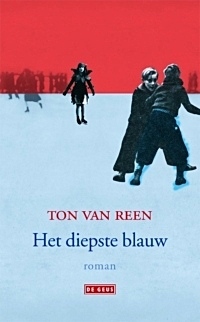 De deur van de voormalige directiekamer staat open. Hij kan er zo binnenrijden. De meubels van de laatste directeuren staan er nog. Alles is gebleven zoals het was. Niemand heeft ooit de moeite genomen hier iets weg te halen. Alles is verrot en vervuild. Het heeft voor niemand waarde meer. Het ziet ernaaruit dat de arbeiders het allemaal in een container voor grof vuil zullen gooien.
De deur van de voormalige directiekamer staat open. Hij kan er zo binnenrijden. De meubels van de laatste directeuren staan er nog. Alles is gebleven zoals het was. Niemand heeft ooit de moeite genomen hier iets weg te halen. Alles is verrot en vervuild. Het heeft voor niemand waarde meer. Het ziet ernaaruit dat de arbeiders het allemaal in een container voor grof vuil zullen gooien.
Het gepolitoerde bureau van Frans-Joseph zit onder het vuil. De kast, met de monsters van de meelproducten die ze maakten, staat er nog. De affiches aan de muur, huisvrouwen die glunderend hun pakken meel vasthouden. De foto’s van de stichters van de fabriek, de weduwe Hubben-Houba zo breed als de molenaar zelf, aan haar rokken zoon Frits, die later de molen zou overnemen, en Tom, de zoon die naar Amerika zou verdwijnen. En de dochters die naar het klooster werden gestuurd, zodat ze geen beroep konden doen op de erfenis, en zo geruisloos uit de geschiedenis van de familie en van de fabriek werden weggesluisd.
De grote foto van Frits Hubben, de erfgenaam die het bedrijf liet verhuizen van de watermolen naar de fabriek, zittend aan een bureau. Naast hem de twee zonen, Frans-Hubert en Frans-Joseph, beiden al met een blik in de ogen die verraadt dat het hen allemaal geen bal interesseert.
De foto’s van de laatste generatie. De kinderen van Frans-Hubert en van Frans-Joseph, van wie niemand nog in het bedrijf heeft gewerkt, vrolijk lachend bijeen op een grasveld voor een villa.
Hij vindt het jammer dat hij niet eerder wist dat dit hier allemaal hing te vergaan. Hij had het graag willen behouden. De foto’s had hij kunnen bewaren in zijn archief, maar nu zijn ze waardeloos. Vocht heeft ze aangetast en beschimmeld. Waterkringen lopen door het rottende papier. Deze rotzooi kan hij niet meer mee naar huis nemen, ook al zou hij het willen. Lizet wil het zeker niet in huis hebben.
In een laatje vindt hij stukken van het reclamearchief, waar Frits Hubben zo zorgvuldig mee omging. Foto’s van vrouwen die verlekkerd een beslag kloppen, met in hun hand een pak patentmeel van Hubben. Foto’s van de verpakkingen van Luxe- en Excellentmeel, die zo mooi zijn dat ze van meel een kostbaarheid maken. Een foto van een dikke man, glunderend met een pak anti-obstipatiemeel vol zemelen in de hand, het wondermeel waarvan hardlijvige mensen een gezonde stoelgang zouden krijgen. Foto’s in een bakkerij waar de balen Hubben Broodmeel hoog liggen opgeslagen, en de bakker en zijn knechten trots de glimmende broden met suikerkorst tonen. Winkels in levensmiddelen en koloniale waren met Hubbens bijzondere soorten brood- en bakmeel in de rekken. Hubbens broodmeel in Indonesië en Zuid-Afrika. Alle foto’s stralen glorie uit en demonstreren daardoor des te meer hoe onnodig de ondergang van de fabriek was.
In zijn woede grijpt hij een pot met een verdroogde bloem van de vensterbank en gooit hem naar het familieportret van de lapzwansen. Het glas rinkelt. Dat doet goed.
Dan pas ziet hij de bouwlift, aan de achterkant van de silo. Die moeten ze vandaag hebben geplaatst. In een opwelling rijdt hij ernaartoe en rolt het platform op van de lift. Hij drukt op de knop. Het ding werkt. Ze hebben vergeten de stroom uit te schakelen.
Langzaam gaat hij naar boven. Het is opwindend. Hij voelt zich een klein kind dat iets doet wat verboden is.
De lift staat stil. Hij is op het hoogste punt aangekomen. Nu weer naar beneden? Of het dak op? De vloerplaat kan uitgeschoven worden. Door een druk op een knop schuift de plaat tot op het dak en vormt een brug.
Hij rijdt het dak op. Hij kijkt rond en voelt zich vrij.
Op nog geen halve meter van de rand stopt hij de rolstoel. Tussen zijn voeten doorkijkend, in de diepte, ziet hij het dorp zoals een vogel het ziet. De rookpluimen boven de rode, blauwe en grauwe daken. Hij kan ze tellen. Nu hij er bovenop kijkt, ontdekt hij de regelmaat in het patroon. Broederlijk liggen de huizen dicht naast elkaar. Hun goten omarmen elkaar en verbinden meer dan honderd huizen. Aan elkaar gesloten pannenrijen, rood, blauw en grijs, versterken het beeld van een gesloten dorp.
Vanaf hier is zijn huis het zevende dak van rechts. Als je het dorp vanaf het noorden binnenkomt, is zijn huis het derde aan de rechterkant. Kom je vanuit het zuiden, dan is het ‘t tweeëntwintigste huis aan de linkerkant. Kom je van de weg langs de Wijer, dan is het vanaf de brug het zevende huis rechts, aan de overkant van de straat.
Zou je met een bootje over de Wijer het dorp binnenvaren tegen de stroom op, dan is het het negende huis links. Tegenover zijn huis ligt slagerij Kemp. Kemp levert bierworst aan café De Zwaan, dat aan de andere kant van de brug ligt, en fijne vleeswaren als er in De Zwaan een uitvaartmaal wordt geserveerd of als er een trouwpartij is.
Maar er komt niemand over de Wijer het dorp binnenvaren. Nu, laat in de middag, is de beek een zilveren streep tussen de weilanden, die soms heel even zwart wordt als er een wolk voor de zon trekt. Vanmiddag zijn er weinig wolken. De zon schijnt zo overdadig dat de miljoenen margrieten langs het riviertje een breed wit tapijt vormen. De oevers zijn net zo wit als vroeger, toen de weide wit was omdat zijn moeder er de lakens op te bleken had gelegd en hij haar moest helpen om stenen op de hoeken te leggen, zodat de wind ze niet kon meenemen.
Van bovenaf lijkt het dorp veel lieflijker dan het in werkelijkheid is. Het centrum van vroeger is maar klein. De huizen staan er dicht op elkaar, alsof ze bang zijn voor de uitgestrektheid van de velden, weilanden en bossen die het dorp omringen, maar vooral voor de groeiende buitenwijken.
Hoewel het dorp diep beneden hem ligt, lijkt alles waar hij naar kijkt toch heel dichtbij. De wand van de silo versterkt de geluiden van beneden, zodat hij alles hoort wat zich daar afspeelt. Er zijn maar een paar mensen op straat, maar doordat hij van zo hoog op hen neerkijkt, hebben ze hun proporties verloren: het zijn gedrongen poppetjes.
Nu hoeft hij alleen maar de rem van zijn rolstoel te ontkoppelen, de wind zal hem wel een zetje willen geven. Voor het eerst sinds lang zullen ze naar hem kijken, allemaal, daar in het dorp. Hij glimlacht bij de gedachte, juist omdat hij dat niet nodig heeft. Hij hoeft geen aandacht, hij wil alleen maar dat ze weten wie hij is.
Hij hoort hoe de mensen met elkaar praten. De daken kunnen wel het zicht op de mensen verbergen, maar nemen niet hun stemmen weg. Hij meent zelfs het ademen van de baby in de tuin van zijn dochter te horen. En het snorren van de poes, die als een bal opgerold aan het voeteneind in de kinderwagen ligt. Het is gevaarlijk. De kat mag niet op de baby gaan liggen, dat zou de dood van het kind kunnen betekenen.
Eigenlijk zou hij moeten schreeuwen, om de kat te verjagen. Maar het beest zal hem niet horen. Van beneden kan niemand hem horen. Hij heeft eens een man vanaf het dak van de silo naar beneden zien schreeuwen, de mond wijdopen, de handen als een toeter aan de mond, maar niemand hoorde hem.
Het is zelfs nog maar de vraag of ze hem van de straat af kunnen zien. Als ze naar boven zouden kijken, kijken ze tegen de onderkant van de rolstoel aan, de voetenplankjes. Ze zullen denken dat het ding iets is van de aannemer die de silo verbouwt.
Opeens hoort hij zoemen achter zijn rug. De lift. De vloerplaat wordt naar binnen gehaald. Dan zakt de lift naar beneden. Heeft iemand hem ontdekt? Halen ze hem nu van het dak?
Hij hoort veel stemmen tegelijk en doet moeite om het koor van geluiden te ontrafelen. Een voor een weet hij de stemmen in zijn oren te ontcijferen. De stem van Kemp, de slager, de stemmen van de samenwonende nichtjes Tinie en Tinie van de Bercken, die beiden al bijna honderd moeten zijn en theedrinken op het terras achter het huis waarmee ze samen in de tijd wegzakken. De postbode, die `post!’ roept bij elke brievenbus waar hij wat in gooit, ook bij een huis dat al jaren leegstaat en waarin de post zich in de gang tot een berg heeft opgehoopt.
Hij hoort niet alleen de stemmen van degenen die beneden zijn, er klinken ook fragmenten door van stemmen van langgeleden. De bewoners van het kerkhof. Grootvader Bernhard. Juffrouw Fijnhout. Ze zijn rumoerig en praten door elkaar heen, net of ze hem allemaal tegelijk iets willen zeggen. Of ze hem roepen. Eén stem is goed te verstaan omdat hij zacht en rustig is. Grootvader Bernhard. Fragmenten van zinnen. `Zonnebloemen zijn … zomerbui … lusten jullie een … heb ik al klaar’, waaruit Mels begrijpt dat regen goed was voor zonnebloemen en dat grootvader glazen limonade voor hen op het aanrecht heeft staan. Hoewel grootvader Bernhard steeds stukken van zinnen inslikt, begrijpt hij hem toch goed als hij zegt: `Niet doen … is heilig … niet de hand aan …’ Even ziet hij hem zitten, in zijn leunstoel, boven op de betonnen grafsteen, maar dan lost zijn beeld op in het zonlicht om weer op te duiken bij het molenhuis, op zijn stukje land bij de Wijer.
Ton van Reen: Het diepste blauw (102)
wordt vervolgd
• fleursdumal.nl magazine
More in: - Book News, - Het diepste blauw, Archive Q-R, Reen, Ton van
Metershoge spinnen, kolossale ogen en hangende spiralen in de monumentale vleugelnootboom.
Dit voorjaar presenteert het Rijksmuseum Louise Bourgeois in de Rijksmuseumtuinen. Het is voor het eerst dat een ruime selectie van Bourgeois’ buitenbeelden bijeen wordt gebracht.
Met twaalf beelden toont het Rijksmuseum een overzicht van een halve eeuw werk, van The Blind Leading the Blind (1947-49) tot Crouching Spider (2003). Veel van deze werken zijn nooit eerder in Nederland te zien geweest.
Louise Bourgeois (1911-2010) geniet internationale faam als een van de belangrijkste vrouwelijke kunstenaars van de twintigste eeuw en werd wereldberoemd met haar monumentale beelden van spinnen.
Louise Bourgeois in de Rijksmuseumtuinen
Tentoonstelling 24 mei – 3 november 2019
Van de hand van de samensteller van de tentoonstelling, Alfred Pacquement, verschijnt een catalogus: Louise Bourgeois in de Rijksmuseumtuinen in het Nederlands en Engels. Vanaf begin juni verkrijgbaar via rijksmuseumshop.nl. Prijs: €15,-
# meer informatie op website rijksmuseum
• fleursdumal.nl magazine
More in: - Book News, Archive A-B, Art & Literature News, Exhibition Archive, Louise Bourgeois, Sculpture
For the first time in a quarter century, a major new volume of translations of the beloved poetry of Federico García Lorca, presented in a beautiful bilingual edition
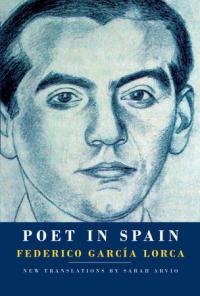 The fluid and mesmeric lines of these new translations by the award-winning poet Sarah Arvio bring us closer than ever to the talismanic perfection of the great García Lorca. Poet in Spain invokes the “wild, innate, local surrealism” of the Spanish voice, in moonlit poems of love and death set among poplars, rivers, low hills, and high sierras.
The fluid and mesmeric lines of these new translations by the award-winning poet Sarah Arvio bring us closer than ever to the talismanic perfection of the great García Lorca. Poet in Spain invokes the “wild, innate, local surrealism” of the Spanish voice, in moonlit poems of love and death set among poplars, rivers, low hills, and high sierras.
Arvio’s ample and rhythmically rich offering includes, among other essential works, the folkloric yet modernist Gypsy Ballads, the plaintive flamenco Poem of the Cante Jondo, and the turbulent and beautiful Dark Love Sonnets—addressed to Lorca’s homosexual lover—which Lorca was revising at the time of his brutal political murder by Fascist forces in the early days of the Spanish Civil War.
Here, too, are several lyrics translated into English for the first time and the play Blood Wedding—also a great tragic poem. Arvio has created a fresh voice for Lorca in English, full of urgency, pathos, and lyricism—showing the poet’s work has grown only more beautiful with the passage of time.
Federico García Lorca may be Spain’s most famous poet and dramatist of all time. Born in Andalusia in 1898, he grew up in a village on the Vega and in the city of Granada. His prolific works, known for their powerful lyricism and an obsession with love and death, include the Gypsy Ballads, which brought him far-reaching fame, and the homoerotic Dark Love Sonnets, which did not see print until almost fifty years after his death. His murder in 1936 by Fascist forces at the outset of the Spanish Civil War became a literary cause célébre; in Spain, his writings were banned. Lorca’s poems and plays are now read and revered in many languages throughout the world.
Sarah Arvio is the author of night thoughts:70 dream poems & notes from an analysis, Sono: Cantos, and Visits from the Seventh: Poems. Winner of the Rome Prize and the Bogliasco and Guggenheim fellowships, among other honors, Arvio works as a translator for the United Nations in New York and Switzerland and has taught poetry at Princeton University.
Poet in Spain
By Federico Garcia Lorca
Translated by Sarah Arvio
Hardcover
576 Pages
Published by Knopf
2017
ISBN 9781524733117
Category: Poetry
$35.00
# More poetry
Federico Garcia Lorca
Poet in Spain
• fleursdumal.nl magazine
More in: - Book News, Archive K-L, Archive K-L, Art & Literature News, Garcia Lorca, Federico, REPRESSION OF WRITERS, JOURNALISTS & ARTISTS, WAR & PEACE
From blogger Heather B. Armstrong (dooce), author of It Sucked and Then I Cried, comes The Valedictorian of Being Dead (Gallery), an irreverent new memoir – reminiscent of Brain on Fire – about her experience as one of only a few people to participate in an experimental treatment for depression involving 10 rounds of a chemically-induced coma approximating brain death.
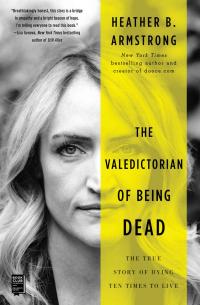 For years, Heather Armstrong has alluded to her struggle with depression on her website, dooce. It’s scattered throughout her archive, where it weaves its way through posts about pop culture, music, and motherhood. But in 2016, Heather found herself in the depths of a depression she just couldn’t shake, an episode darker and longer than anything she had previously experienced. She had never felt so discouraged by the thought of waking up in the morning, and it threatened to destroy her life. So, for the sake of herself and her family, Heather decided to risk it all by participating in an experimental clinical trial involving a chemically induced coma approximating brain death.
For years, Heather Armstrong has alluded to her struggle with depression on her website, dooce. It’s scattered throughout her archive, where it weaves its way through posts about pop culture, music, and motherhood. But in 2016, Heather found herself in the depths of a depression she just couldn’t shake, an episode darker and longer than anything she had previously experienced. She had never felt so discouraged by the thought of waking up in the morning, and it threatened to destroy her life. So, for the sake of herself and her family, Heather decided to risk it all by participating in an experimental clinical trial involving a chemically induced coma approximating brain death.
Now, for the first time, Heather recalls the torturous eighteen months of suicidal depression she endured and the month-long experimental study in which doctors used propofol anesthesia to quiet all brain activity for a full fifteen minutes before bringing her back from a flatline. Ten times. The experience wasn’t easy. Not for Heather or her family. But a switch was flipped, and Heather hasn’t experienced a single moment of suicidal depression since.
Disarmingly honest, self-deprecating, and scientifically fascinating, The Valedictorian of Being Dead brings to light a groundbreaking new treatment for depression.
Author: Heather B. Armstrong
The Valedictorian of Being Dead:
The True Story of Dying Ten Times to Live
Binding: Hardcover
Publication date: 04/23/2019
Publisher: SIMON & SCHUSTER TRADE
Pages: 272
ISBN13: 9781501197048
ISBN10: 1501197045
List Price $26.00
# new books
Heather B. Armstrong
The Valedictorian of Being Dead
• fleursdumal.nl magazine
More in: - Book News, Archive A-B, DRUGS & DISEASE & MEDICINE & LITERATURE, MONTAIGNE, NONFICTION: ESSAYS & STORIES
Mels is ziek van eenzaamheid. Tijger en Thija hebben diepe gaten in zijn hoofd achtergelaten. En grootvader Bernhard kan hem niet troosten, al vertelt hij nog zulke mooie verhalen. Zijn hoofd wil geen verhalen meer horen. Zelfs zijn moeder kan hem niet troosten, terwijl ze heel goed begrijpt wat er in hem omgaat.
 Maar zijn vader vindt hem een mietje omdat hij zo lang verdriet heeft over een meisje.
Maar zijn vader vindt hem een mietje omdat hij zo lang verdriet heeft over een meisje.
`Het land zit vol meisjes’, zegt zijn vader. `En stuk voor stuk zijn ze mooier dan dat spichtige ding. Je wordt nog honderd keer verliefd.’ Hij kan zijn vader wel vermoorden.
Lusteloos zit hij in de boot en kijkt in het dode, zwarte water van de Wijer. Hij snapt niet dat ze hier vroeger zulke vette, blinkende vissen hebben gevangen. Zilveren forellen met roze buiken. Het is nu al meer dan een week geleden dat Thija vertrokken is en nog steeds heeft ze geen brief gestuurd.
Met moeite roeit hij naar de brug, maar de boot is veel zwaarder dan vroeger en loopt steeds aan de grond. Elke keer als hij, tot aan de knieën in het water, de boot vlot moet duwen, zou hij het liefst gillend naar het andere eind van de wereld rennen. Wat heb je aan een boot als je er helemaal alleen in zit en niet weet waar je naartoe wilt varen?
Eindelijk is hij bij de brug. Lizet van het café hangt over de reling. Hij ziet haar pas als hij de boot vastlegt en op de wal wil springen.
`Wíj hebben een echte boot’, zegt Lizet.
`Krijg de pest met je boot’, wil hij roepen, maar hij doet het niet.
`Mijn vader heeft een motorboot gekocht. Zondag gaan we varen. Je mag mee als je wilt.’
`Als ik niks te doen heb’, zegt Mels, maar hij weet nu al dat hij niet mee wil.
`Er is nooit wat te doen op zondag’, zegt Lizet.
Mels weet dat ze gelijk heeft. Dat heeft hij afgelopen zondag voor het eerst gemerkt. Toen was Thija pas één dag weg. Toen Tijger er nog was, gingen ze met z’n drieën roeien, schaatsen, of eekhoorns vangen. Op zondagen reisden ze naar China op de woorden van Thija. De zondagen waren veel te kort. Maar aan de eerste zondag waarop hij alleen was, kwam geen einde.
Hij wordt al ziek als hij denkt aan de komende zondag.
`Verdomme!’ Hij schreeuwt het uit.
`Praat je vaak in jezelf?’ vraagt Lizet.
`Hoezo?’
`Je vloekt tegen jezelf.’
`Die rotboot. Het is meer duwen dan varen.’
`Ga toch mee, zondag. Dan zie je pas een echte boot. Met een kajuit.’
`Goed, ik ga mee.’ Hij zegt het omdat hij bang is voor de komende zondag. Hij kan niet tegen een zwarte zondag, waarop alle bomen zwart zijn en het riet zwart is en hij niet eens bij zijn grootvader Bernhard kan zijn omdat alles in zijn huis zwart, morsdood en leeg is.
`We vertrekken om acht uur, met de auto.’
`Niet met de boot?’
`Je denkt toch niet dat we met een motorboot op de Wijer gaan varen. Zo’n roestbeek. We hebben de boot op de Maas liggen.’
Mels heeft al spijt van zijn belofte.
Ton van Reen: Het diepste blauw (101)
wordt vervolgd
• fleursdumal.nl magazine
More in: - Book News, - Het diepste blauw, Archive Q-R, Reen, Ton van
Wel honderd keer is hij naar Rotterdam gereisd, op zoek naar Thija. Een paar keer per jaar. Hij heeft zich nooit los kunnen maken van de Wijer en de boottochtjes met Tijger en Thija. Die herinneringen zijn z’n intiemste bezit. Als een schatbewaarder is hij bij de Wijer blijven wonen.
 In Rotterdam heeft hij geen spoor van haar gevonden. Zijn hele leven is hij op zoek geweest naar een schim. Natuurlijk was ze anders geworden. Natuurlijk was ze net zo oud als hij en moest hij haar niet zoeken tussen de kinderen die op straat speelden, maar tussen de vrouwen in de winkels, in de trams, in de restaurants, in de opiumkitten. Bij alle vrouwen keek hij naar de knieën, op zoek naar het roze mondje op de rechterknie, maar hij vond het nooit terug. Vaak had hij er zich belachelijk door gemaakt.
In Rotterdam heeft hij geen spoor van haar gevonden. Zijn hele leven is hij op zoek geweest naar een schim. Natuurlijk was ze anders geworden. Natuurlijk was ze net zo oud als hij en moest hij haar niet zoeken tussen de kinderen die op straat speelden, maar tussen de vrouwen in de winkels, in de trams, in de restaurants, in de opiumkitten. Bij alle vrouwen keek hij naar de knieën, op zoek naar het roze mondje op de rechterknie, maar hij vond het nooit terug. Vaak had hij er zich belachelijk door gemaakt.
En haar vader? Hij had er vaak over gesproken met de heer Wong Lun Hing, die een hotelletje had waar hij altijd had overnacht. De heer Wong had overal navraag gedaan in de Chinese gemeenschap, maar geen spoor gevonden van een Lacoste die getrouwd was met een Chinese. De enige Lacoste die ze hadden kunnen ontdekken was een Fransman geweest, die een theeplantage had gehad in China en die, al wat ouder, toen hij zijn plantage aan de communisten had verloren, in Rotterdam was gaan wonen en een handel in thee had opgezet. Een thee-imperium dat handelde over de hele wereld. Hij woonde in Rotterdam en had een zoon. Navraag bij hem had niets opgeleverd.
Tot Wong Lun Hing op zekere dag had geopperd dat die heren van de thee er in hun goede tijden in China meestal bijzitten op na hielden. Buitenvrouwen. Had Lacoste zo’n buitenvrouw laten overkomen en haar ver weg van Rotterdam in een huis gezet waar hij haar af en toe bezocht?
Op eigen houtje was Mels achter Lacoste aangegaan, maar op het adres dat Wong Lun Hing had achterhaald, woonde iemand anders, iemand die alleen maar wist dat hij het huis had gekocht van een makelaar, die het te koop had aangeboden omdat de vorige eigenaar was gestorven, waarna zijn weduwe met onbekende bestemming was vertrokken.
Een dood spoor, maar wel een spoor dat veel onrust in hem had gewekt.
In een paar kranten had hij een oproep geplaatst aan Thija Lacoste, ondertekend met Mels Gommans. Nooit had hij er iets op gehoord.
Door al zijn zoektochten had hij de stad Rotterdam leren kennen. De havens, die jaar na jaar veranderden. De straten die nooit hetzelfde waren. De mensen van wie hij zich nooit een gezicht herinnerde, maar wel het rumoer dat ze maakten. De hoerenbuurt. Chinese meisjes bij de vleet. Matrozenhoeren die spaarden voor een eigen zaak, een eigen bordeel.
Telkens was hij teleurgesteld teruggekomen uit Rotterdam. Thuis was zijn eerste gang steeds naar de Wijer, waar de boot lag te verrotten in het riet. Na jaren restte er niet meer van dan het rondhout van de boeg. Hij nam het mee naar huis en bewaarde het op zolder. De laatste tastbare herinnering aan Tijger en Thija.
Sinds hij in de rolstoel zit, is hij niet meer in Rotterdam geweest.
Ton van Reen: Het diepste blauw (100)
wordt vervolgd
•fleursdumal.nl magazine
More in: - Book News, - Het diepste blauw, Archive Q-R, Reen, Ton van
A brilliant second collection by Sally Wen Mao on the violence of the spectacle ― starring the film legend Anna May Wong
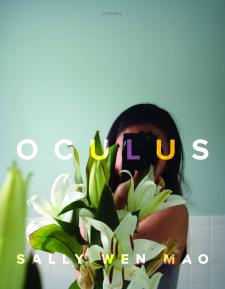 In Oculus, Sally Wen Mao explores exile not just as a matter of distance and displacement but as a migration through time and a reckoning with technology. The title poem follows a nineteen-year-old girl in Shanghai who uploaded her suicide onto Instagram.
In Oculus, Sally Wen Mao explores exile not just as a matter of distance and displacement but as a migration through time and a reckoning with technology. The title poem follows a nineteen-year-old girl in Shanghai who uploaded her suicide onto Instagram.
Other poems cross into animated worlds, examine robot culture, and haunt a necropolis for electronic waste. A fascinating sequence spanning the collection speaks in the voice of the international icon and first Chinese American movie star Anna May Wong, who travels through the history of cinema with a time machine, even past her death and into the future of film, where she finds she has no progeny.
With a speculative imagination and a sharpened wit, Mao powerfully confronts the paradoxes of seeing and being seen, the intimacies made possible and ruined by the screen, and the many roles and representations that women of color are made to endure in order to survive a culture that seeks to consume them.
I will blow a hole
in the airwaves, duck lasers in my dugout.
I’m done kidding them. Today I fly
the hell out in my Chrono-Jet.
To the future, where I’m forgotten.
(from “Anna May Wong Fans Her Time Machine”)
“The poems in Oculus are rangy, protean, contradictory. They offer an alternative to the selfie, that static reduction of a person to her most photogenic poses.”— The New Yorker
Sally Wen Mao is the author of a previous poetry collection, Mad Honey Symposium. Her work has won a Pushcart Prize and fellowships at Kundiman, George Washington University, and the New York Public Library Cullman Center.
Oculus: Poems
by Sally Wen Mao (Author)
Paperback
96 pages
January 15, 2019
Publisher: Graywolf Press
Language: English
Subject: Poetry
ISBN-10: 1555978258
ISBN-13: 978-1555978259
Product Dimensions: 6.9 x 0.4 x 9.1 inches
$16.00
# more poetry
Sally Wen Mao
Oculus
• fleursdumal.nl magazine
More in: - Book News, Archive M-N, Archive M-N, Art & Literature News
De Vlaamse televisiemaker, muzikant en schrijver Jan Leyers (1958) is de winnaar van de E. du Perronprijs 2018.
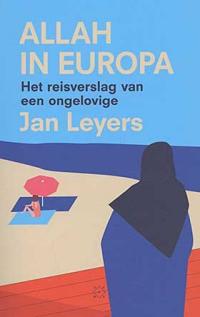 De jury honoreert zijn boek Allah in Europa: reisverslag van een ongelovige. Volgens de jury een: ‘fascinerend boek waarin een veelheid aan ideeën en opinies aan de orde komt, waaraan de lezer zijn of haar eigen mening kan scherpen’.
De jury honoreert zijn boek Allah in Europa: reisverslag van een ongelovige. Volgens de jury een: ‘fascinerend boek waarin een veelheid aan ideeën en opinies aan de orde komt, waaraan de lezer zijn of haar eigen mening kan scherpen’.
De andere genomineerden voor de prijs waren Ilja Leonard Pfeijffer met Grand Hotel Europa en Jolande Withuis Raadselvader.
Leyers krijgt 2500 euro voor de E. du Perronprijs, een initiatief van de gemeente Tilburg, de Tilburg School of Humanities & Digital Sciences van de Tilburgse universiteit en de organisatie Kunstloc Brabant.
E. du Perronprijs 2018 voor het boek Allah in Europa: reisverslag van een ongelovige van Jan Leyers
• fleursdumal.nl magazine
More in: - Book News, - Book Stories, Archive K-L, Art & Literature News, Awards & Prizes, MONTAIGNE, PRESS & PUBLISHING, WAR & PEACE
In materials as diverse as wood, steel, bronze, latex, marble, plaster, resin, hemp, lead, ink, pencil, crayon, woodcut, watercolor and gouache, Louise Bourgeois (1911–2010) investigates every imaginable manifestation of the spiral, from graphic patterns to graphite whorls, wobbly orbits to chiseled vortices, twisted columns to coiling snakes, staircases and pyramids.
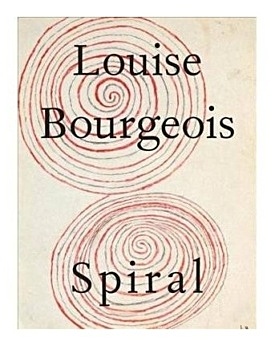 The cursive blue-paper word drawings also included, in English and French, complement the purely visual works by conveying the spirit of Bourgeois’ writing in extraordinary pictorial forms.
The cursive blue-paper word drawings also included, in English and French, complement the purely visual works by conveying the spirit of Bourgeois’ writing in extraordinary pictorial forms.
Bourgeois called the spiral “an attempt at controlling the chaos. It has two directions. Where do you place yourself, at the periphery or at the vortex?”
In another context, she has also stated “I would dream of my father’s mistress. I would do it in my dreams by wringing her neck.
The spiral—I love the spiral—represents control and freedom.”
Louise Bourgeois:
Spiral
Text by Louise Bourgeois (Artist)
Hardcover
84 pages
Publisher: Damiani
(February 19, 2019)
Language: English
ISBN-10: 886208644X
ISBN-13: 978-8862086448
Product Dimensions: 9.2 x 0.8 x 12 inches
$50.00
# new book
Louise Bourgeois
Spiral
• fleursdumal.nl magazine
More in: - Book News, - Bookstores, Archive A-B, Art & Literature News, Louise Bourgeois, Sculpture
The dramatic, larger-than-life true story behind the founding of Oculus and its quest for virtual reality, by the bestselling author of Console Wars.
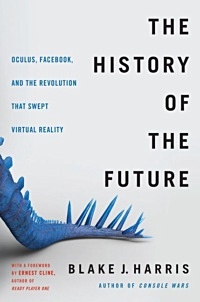 In The History of the Future, Harris once again deep-dives into a tech drama for the ages to expertly tell the larger-than-life true story of Oculus, the virtual reality company founded in 2012 that—less than two years later—would catch the attention of Mark Zuckerberg and wind up being bought by Facebook for over $2 billion dollars.
In The History of the Future, Harris once again deep-dives into a tech drama for the ages to expertly tell the larger-than-life true story of Oculus, the virtual reality company founded in 2012 that—less than two years later—would catch the attention of Mark Zuckerberg and wind up being bought by Facebook for over $2 billion dollars.
This incredible underdog story begins with inventor Palmer Luckey, then just a nineteen-year-old dreamer, living alone in a camper trailer in Long Beach, California. At the time, virtual reality—long-hailed as the ultimate technology—was so costly and experimental that it was unattainable outside of a few research labs and military training facilities. But with the founding of Oculus, and the belief that his tantalizing vision of the future could one day be more than science fiction, Luckey put everything he had into creating a device that would allow gamers like him to step into virtual worlds and, in doing so, hopefully kickstart a VR revolution.
Over the course of three years, Harris conducted hundreds of interviews with key players in the VR revolution—including Luckey, his partners, and their cult of dreamers—to weave together a rich, cinematic narrative that captures the breakthroughs, breakdowns, and human drama of trying to change the world.
The result is a supremely accessible, entertaining look at the birth of a new multi-billion-dollar industry; one full of heroes, villains, and twists at every corner. Take, for instance, Harris’ own discovery while writing this story. When he started this endeavor, he had no idea that this tale would somehow involve Donald Trump, billion-dollar lawsuits, illegal practices, and end with Luckey—eventually ousted from Facebook—as one of the most polarizing figures in Silicon Valley.
The History of the Future.
Oculus, Facebook, and the Revolution That Swept Virtual Reality
by Blake J. Harris
Hardcover
Pages: 528
HarperCollins Publishers
Imprint: Dey Street Books
On Sale: 02/19/2019
ISBN: 9780062455963
ISBN 10: 0062455966
Computers / Virtual Worlds
List Price: 28.99 USD
# new books
The History of the Future
Blake J. Harris
• fleursdumal.nl magazine
More in: - Book News, Archive G-H, Art & Literature News, AUDIO, CINEMA, RADIO & TV, Exhibition Archive, Photography, Visual & Concrete Poetry
Thank you for reading Fleurs du Mal - magazine for art & literature